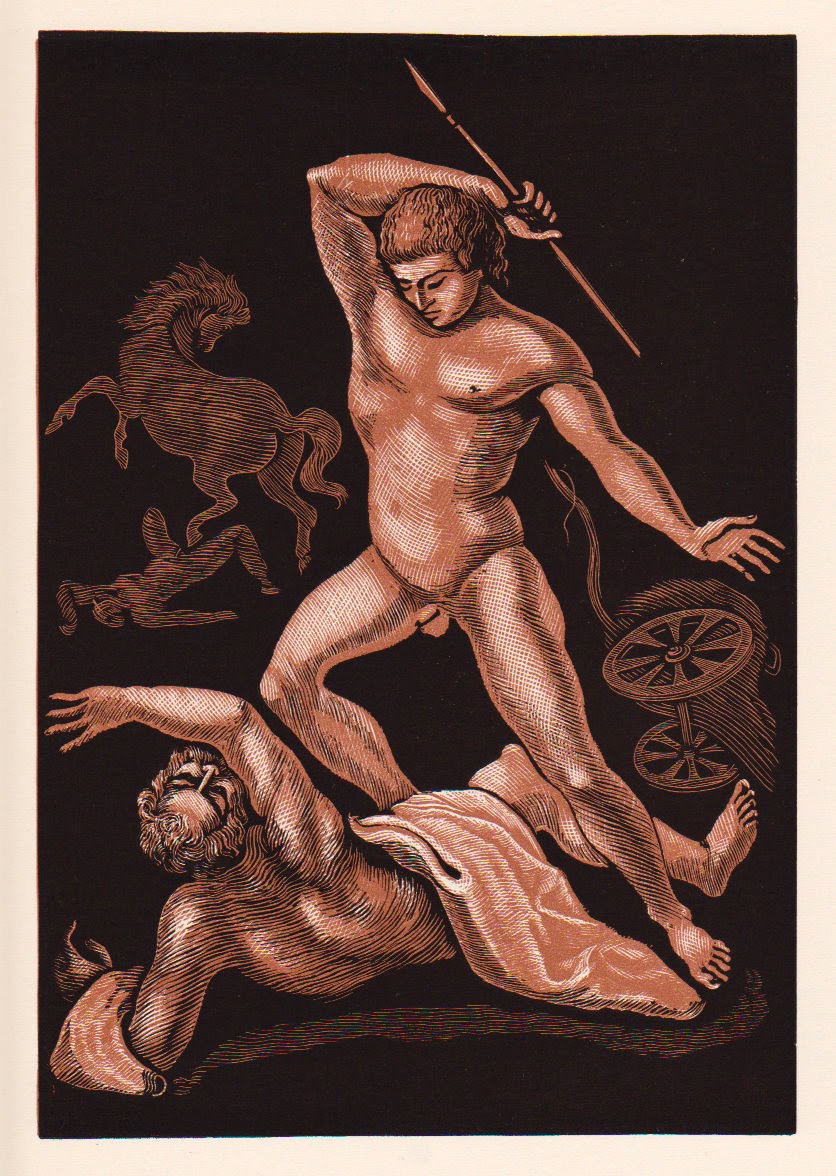Sports Saturday
Earlier this week I turned to The Odyssey to predict that the Denver Broncos would defeat the Seattle Seahawks in the upcoming Super Bowl. A Seattle Seahawks fan (and English teacher) took understandable exception, prompting me to rethink how I was equating the Seahawk players with the suitors. It wasn’t a complimentary comparison and did an injustice to Seattle’s sublime cornerback Richard Sherman, who is proving to be a character far more interesting the Eurylochus or Antinoos.
For that matter, I should rethink how I am equating Peyton Manning to Odysseus. Though they may both be master tacticians and are both very competitive, there’s a dark, bloodthirsty streak to the Ithacan king that I don’t find in the Broncos quarterback. Would Peyton say before a game, as Odysseus does, “Your last hour has come. You die in blood.”
There’s definitely an experience vs. youth dimension to this Super Bowl, however, one that was destined the moment that veterans Manning and Tom Brady squared off in one conference championship game and sophomores Russell Wilson and Colin Kaepernick faced off in the other. But even if one accepts the narrative of Peyton as a one-time king seeking to regain his throne, there are different ways to see the story.
On the one hand, there is the “return of the king” narrative, where order is restored when the rightful king returns. This is the story of Odysseus, King Arthur, Richard the Lion-Hearted, and Tolkien’s Aragorn. On the other, there is the narrative of the tyrannical king who holds on to power for too long, suffocating new growth. The archetype for such kings is the dragon in Beowulf, while killing or otherwise displacing such kings is, of course, the story of Oedipus. Whether you see Manning as beloved monarch or dragon and whether you see the Seahawks as anarchic chaos or new hope may come down to your prior rooting interests. Or, if you are a neutral observer, you may choose a side based on your preferred narrative.
The narrative you choose, however, may tell you more about yourself than the actual athletes. Entire stories are spun about players based on very little. As Peyton himself said about the story that he plays poorly in the cold—this after he threw for 397 yards and four touchdowns against the Titans on an 18-degree day—“Whoever wrote that narrative can shove it where the sun don’t shine.”
Speaking of classical narratives applied to the current playoffs, Gregg Easterbrook of the ESPN’s Grantland compared the recent Bill Belichick-Wes Welker kerfuffle to Oedipus. In case you missed it, former Patriot and now Bronco Wes Welker, on a pick play, injured Patriot cornerback Aqib Talib so that he missed the rest of the game, making it easier for Peyton to unleash his potent passing attack. The Patriots coach called it “one of the worst plays I’ve seen” although the NFL later declared the hit had been legal.
How is this the story of Oedipus (I hear you ask)? Well, here are the highlights of Easterbrook’s argument (but read the whole thing because it’s funny, smart, and wonderfully tangled):
–Welker felt unappreciated at New England. Despite being the franchise’s all-time leader for receptions, he was shown the door the moment a less-expensive Welker-like figure, Danny Amendola, came along. Driven by subconscious oedipal conflict, Welker wanted to slay his father figure, but decided that defeating his father-figure’s team would be more acceptable. In the first Denver-New England game, Welker played poorly and the father figure prevailed. That made it essential for Denver to defeat New England on the second try. Welker entered the contest filled with rage, which in football is a useful emotion.
• Welker was jealous of Talib, who was being welcomed into the Patriots’ locker room just as Welker was being shown out. Welker was the good boy, Talib the prodigal son. Yet Talib received honors — whether the Patriots sacrificed a fatted calf is unknown — while Welker was banished.
• Belichick viewed Welker as a disloyal son. Belichick has made many football players better than expected, but the two over which he waved the magic wand were Brady, an unheralded sixth-round selection who is now a first-ballot Hall of Famer, and Welker, who wasn’t drafted at all, and became a star wearing New England colors. Brady is loyal and grateful; he brings in Dunkin’ Donuts for the coaches using his Lamborghini. Brady never complains in public when the Patriots offer him $57 million! But Welker was not grateful when offered $10 million. Now Belichick so despises the disloyal son that his name cannot be spoken. He’s not Welker, he is “the receiver.”
Taking this literary parallel to its end, we would have to say that Welker ended Belichick’s reign and is now a ruler in New York, a modern day Thebes. Whether an athletic version of the plague will break out, resulting in a Broncos loss, remains to be seen. Stay tuned as Super Bowl saturation continues and we who are besotted scrape for every stray narrative we can find.


